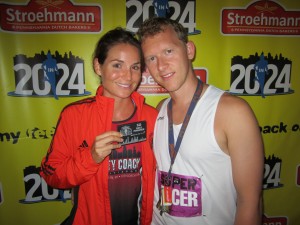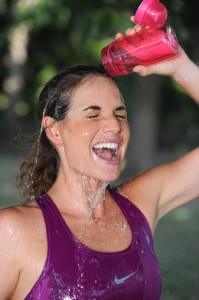Unless you find the fountain of youth, aging is pretty much inevitable. I say “pretty much” because we all age differently. Some of that is due to genetics. And some is due to lifestyle. I remember when I was in my 20s, I was told by 30-something year olds that once I hit 30, everything would go to shit. I’d feel different, and staying in shape would be tough. I never understood why a number would matter so much. Why not 29? Or 34? Why was 30 this magical age where we go from youthful, calorie burning, fit and hangover-free kiddos to old, tired, fat, hangover-fighting people, remembering better days? Having now spent a few years in the “over 30” category, I am now warned and cautioned relatively frequently that my days of being fit, improving as a runner, and eating pizzas and pints of ice cream will catch up with me any day now. So today’s blog is about that magic number, and what’s true and not so true about the “over 30” theory.
Genetics are something we cannot control. If you can look into the physical, mental and emotional aging of your siblings, parents, cousins, grandparents and so on – there are some clues for what you may be able to expect. Some traits, diseases, weaknesses and so on are genetic. Others are brought on by other factors. So your mother isn’t necessarily a clear example of what you will look like, feel like, and be capable of when you are her age. Though you can expect some similarities. Hormone levels play a huge role in how we age – from mood, energy level and sex drive to muscle density, bone density, and so on. Men and women naturally experience a dip in hormones at some point in their life. The dip or change in hormones, combined with perhaps less activity can naturally lead to weight gain, fatigue, and change in mood.
The cool thing is that while we can’t control our genetics, we are pretty darn in control about our choices we make in our lives. Our happiness, quality of life, stress level, sleep, hydration, activity, nutrition choices – all greatly factor into how we age. And while there are certainly things that cannot be helped, like work deadlines or sick children, choosing to eat well and exercise regularly can help many of us age in a slightly more graceful manner. Here’s some helpful info on exercise and being active, food and lifestyle adjustments you can try to make.
Now, if you are an athlete, your body may at some point need extra recovery time and there will be a time those personal records tend to stop happening. But lifting heavy can greatly help our bodies age, and runners can certainly achieve very impressive things after 30, 40, 50, or 60. I’ve had athletes in their 50s and 60s achieve things many folks in their 20s can only dream of doing. And personally, I am faster at almost every race distance in my 30s than I was in my 20s. And I am definitely in better shape. Other runners will peak in their early 20s, but those are usually folks who were running and competing in high school, and quite possibly now feel the consequences of pushing a body still growing and developing.
While we cannot fight Father Time, there are things we can do to stay as active, energetic and strong as possible. So remember the next time you don’t feel like going to the gym or eating a big bowl of greens, that doing things that are good for you are always worth it. This article from Harvard Medical School breaks down how we age when exercising versus not. It’s a good reminder that some changes as we age we cannot really feel, but those changes are important.






